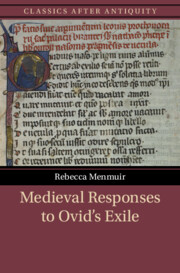Refine search
Actions for selected content:
180 results
37 - Poetry of the South West Asian and North African Diasporas
-
-
- Book:
- The Cambridge History of Australian Poetry
- Published online:
- 19 November 2025
- Print publication:
- 11 December 2025, pp 692-711
-
- Chapter
- Export citation
Chapter 6 - Athenian Politics and the Peloponnesian War
-
-
- Book:
- Reassessing the Peloponnesian War
- Published online:
- 21 August 2025
- Print publication:
- 04 September 2025, pp 148-195
-
- Chapter
- Export citation
Chapter 13 - Migration
- from Part II - Social Contexts
-
-
- Book:
- Sean O'Casey in Context
- Published online:
- 23 June 2025
- Print publication:
- 10 July 2025, pp 140-149
-
- Chapter
- Export citation
Chapter 8 - The Exile of Philosophy
-
- Book:
- Ovid and Plato
- Published online:
- 19 June 2025
- Print publication:
- 03 July 2025, pp 141-157
-
- Chapter
- Export citation
Emotional Landscapes of Diasporic Activism: The Case of the Woman, Life, Freedom Protests in Sweden
-
- Journal:
- Iranian Studies / Volume 58 / Issue 3 / July 2025
- Published online by Cambridge University Press:
- 08 September 2025, pp. 611-639
- Print publication:
- July 2025
-
- Article
- Export citation
Exit as Voice: Implications of Russia’s War for the Understanding of Dissent under Authoritarianism
-
- Journal:
- Perspectives on Politics , First View
- Published online by Cambridge University Press:
- 26 June 2025, pp. 1-16
-
- Article
- Export citation
Epilogue: Forging Exile
- from Part II - Becoming the Exile
-
- Book:
- Medieval Responses to Ovid's Exile
- Published online:
- 27 May 2025
- Print publication:
- 12 June 2025, pp 210-221
-
- Chapter
- Export citation
Chapter 5 - John Gower’s Visio Anglie
- from Part II - Becoming the Exile
-
- Book:
- Medieval Responses to Ovid's Exile
- Published online:
- 27 May 2025
- Print publication:
- 12 June 2025, pp 148-176
-
- Chapter
- Export citation
Introduction
-
- Book:
- Medieval Responses to Ovid's Exile
- Published online:
- 27 May 2025
- Print publication:
- 12 June 2025, pp 1-26
-
- Chapter
- Export citation
Chapter 3 - Resurrecting Ovid
- from Part I - Responding to Exile
-
- Book:
- Medieval Responses to Ovid's Exile
- Published online:
- 27 May 2025
- Print publication:
- 12 June 2025, pp 90-122
-
- Chapter
- Export citation
Chapter 4 - Becoming the Exile
- from Part II - Becoming the Exile
-
- Book:
- Medieval Responses to Ovid's Exile
- Published online:
- 27 May 2025
- Print publication:
- 12 June 2025, pp 125-147
-
- Chapter
- Export citation
Chapter 6 - Geoffrey Chaucer’s Exilic Voice
- from Part II - Becoming the Exile
-
- Book:
- Medieval Responses to Ovid's Exile
- Published online:
- 27 May 2025
- Print publication:
- 12 June 2025, pp 177-209
-
- Chapter
- Export citation
Chapter 2 - Forming Responses
- from Part I - Responding to Exile
-
- Book:
- Medieval Responses to Ovid's Exile
- Published online:
- 27 May 2025
- Print publication:
- 12 June 2025, pp 49-89
-
- Chapter
- Export citation
Chapter 1 - Ovid’s Response
- from Part I - Responding to Exile
-
- Book:
- Medieval Responses to Ovid's Exile
- Published online:
- 27 May 2025
- Print publication:
- 12 June 2025, pp 29-48
-
- Chapter
- Export citation
Chapter 9 - To the Abyss and Back (58 to Early September 57)
-
- Book:
- Cicero
- Published online:
- 10 June 2025
- Print publication:
- 29 May 2025, pp 308-335
-
- Chapter
- Export citation
Chapter 19 - Conclusion: An Intellectual between Tradition and Power
-
- Book:
- Cicero
- Published online:
- 10 June 2025
- Print publication:
- 29 May 2025, pp 715-726
-
- Chapter
- Export citation

Medieval Responses to Ovid's Exile
-
- Published online:
- 27 May 2025
- Print publication:
- 12 June 2025
Chapter 5 - Italy
- from Part I - Life and Death
-
-
- Book:
- Percy Shelley in Context
- Published online:
- 17 April 2025
- Print publication:
- 24 April 2025, pp 34-40
-
- Chapter
- Export citation
Abraham, David, and the Problem of Exile in Calvin’s Theology
-
- Journal:
- Harvard Theological Review / Volume 118 / Issue 2 / April 2025
- Published online by Cambridge University Press:
- 30 July 2025, pp. 314-336
- Print publication:
- April 2025
-
- Article
- Export citation
8 - Theaters of Empire and Exile in Daniel and Esther
-
-
- Book:
- The Cambridge Companion to Biblical Narrative
- Published online:
- 30 January 2025
- Print publication:
- 06 February 2025, pp 152-173
-
- Chapter
- Export citation
